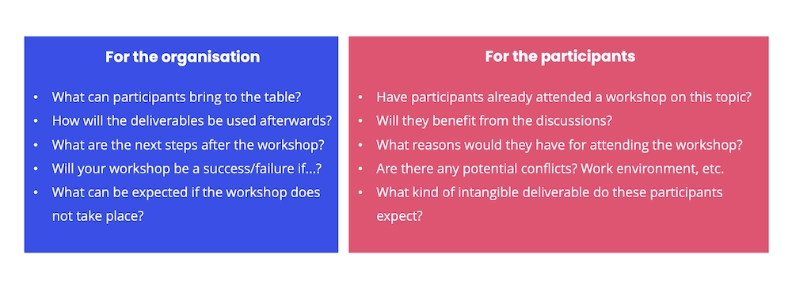... and how to help you identify your real collaborative needs. The world of collaboration is full of pitfalls and tricksters! Even the most well-intentioned person can inadvertently fall into the traps of “collaborative washing”.
What do we mean by that? This term, coined by our very own creative minds and inspired by the expression "green washing", refers to some companies’ desire to use all available tools – including collaborative workshops, participative approaches etc. – to pretend (often internally) to be concerned with collaborative dynamics.
Rather than simply pointing the finger, this article aims to chart, for each erroneous approach, a path to return to the fundamentals of collaboration and collective intelligence:
1. To fill a slot and keep participants busy during an event ⏱
« Well, this topic is not so important but we have a 2-hour slot available, so... Let's just squeeze a workshop there »
⁉️ Why is this wrong?
A superficial workshop leads to lack of preparation from organisers, lower engagement and often generates less interest from participants. Is it wise to take up the time of so many (often busy) people if the activity isn’t necessary?
✅ What are the alternatives?
Either launch a process beforehand to identify key topics to work on during the workshop, whose deliverables will be useful, and measure the motivation of participants on the subject. If you cannot identify any key topic for a workshop, you can also try to come up with another type of activity that will bring greater value to both the organisation and the participants.
2. To keep up with trends and give the impression of being innovative 😎
« Artificial intelligence is super trendy, we need to organize a workshop about it! »
⁉️ Why is this wrong?
Using a trendy topic, a new technology or an innovative tool - unless there’s a real purpose – is the best way to get stuck in a frantic and frankly useless race for the "wow" effect, putting the emphasis on the form rather than the content. Will discussing this topic or using a new app serve any purpose other than giving the (often false) image of being an innovative organisation?
✅ What are the alternatives?
Do you really want your participants to discuss a trendy topic, like AI? Ask yourself:
- What added value will my participants bring to the organisation by thinking and debating about this topic?
- Are my participants legitimate/ready to discuss this topic?
- Will the deliverables really be useful for the organisation?
If the answer is "none/no", it’s not a collaborative workshop you need, but more of an educational activity so that participants can LEARN about the topic before to be able to discuss it.
3. To give the impression of contributing to a decision… that has already been made 🤥
« We decided last month what we will do, but we think it is important that participants express their preferred option. Let's hope they will recommend what we inted to do... »
⁉️ Why is this wrong?
Misleading participants into thinking they’re going to contribute to a decision that has already been made is an obvious pitfall for organisations still immature in their collaborative work. This approach is commonly used as a strategy to make sure the decision is "validated" before it’s communicated. But if participants have an inkling of what’s really going on, this may lead to a strong distrust of future collaborative initiatives, perceived as mere internal communication gimmicks.
✅ What are the alternatives?
Explain your decision and ask your participants to share on aspects on which they can have a real impact. For example, gather their feedback and have them discuss the option that has already been selected, or ask them for their input regarding its implementation.
4. To please the boss(es) 🤓
« Boss is expecting a workshop on Tuesday, we need to come up with a topic! »
⁉️ Why is this wrong?
Any successful workshop requires aligning the expectations and needs of all players involved, i.e. the organisation (represented by the lead team, project team or sponsor) and the participants. Focusing on the expectations of only one stakeholder will alienate the other, resulting in unused deliverables and sterile discussions based only on what management wants.
✅ What are the alternatives?
Identify workshop topics based on the goals, obstacles and challenges experienced by employees daily. What if the subject to address is linked to the organisation's global strategy? Ask your facilitation team to find a relevant angle that strikes the right balance between theory (strategy) and the reality on the ground.
5. To “tick the workshop box” ☑️
« Now that we have talked about topic X, no one can tell us that we did not do anything! »
⁉️ Why is this wrong?
A "tick the box" workshop often implies that the organising team is not convinced of its importance. It’s therefore safe to assume that the deliverables will be barely used, if at all. If your participants are not interested in the topic either, then you will simply be wasting everyone's time. And if they do consider the subject to be of primary importance, a simple workshop will certainly not be enough to meet their expectations! In short, collaborative workshops require a real commitment and must be part of a more global approach.
✅ What are the alternatives?
If neither side is really interested in a topic that needs to be addressed, choose another format, which requires less effort from everyone. And if the topic is close to the participants' hearts, it’s time to launch a more comprehensive approach.
To conclude...
Why should you avoid this⁉️
These misguided approaches tend to result in "make-believe" and “bullshit” workshops, or sessions seen as mere internal communication tools. This can be detrimental in the long run:
Participants may feel that their time is being misused, which can be a very sensitive issue in organisations with high workloads
Participants may think that they are being manipulated, which is particularly likely to happen in organisations already suffering from a lack of transparency
It undermines the credibility of your process and collaborative workshops, or indeed any collective intelligence process
It’s important to be aware that new generations, such as Generation Z, are particularly sensitive to the fit between their personal values and those of their company, but also to the coherence between what an organisation says and what it does.
What approach should you take ✅
How do you make sure your workshop should indeed be organised as part of a virtuous and useful collaborative process? The key is to ask yourself a few questions before contacting your facilitation team, allowing them to understand your real needs:

What if you contacted a facilitation team with one of these "wrong reasons"? Don't panic! If you realise that your approach is missing something, this is the perfect opportunity to discuss it with your facilitation team to reframe the process and jointly identify goals that will be beneficial to all!
Far be it from us to question the efficiency or goodwill of organisations in their collaboration work. We would simply like to remind you that any shared approach requires you to regularly take the time to clarify the real motivations and issues before launching a new initiative.
This is particularly important to us and we’re convinced that many, if not all, of our fellow facilitators share the same standards. We encourage all organisations to leverage the expertise of facilitation teams before taking action!
